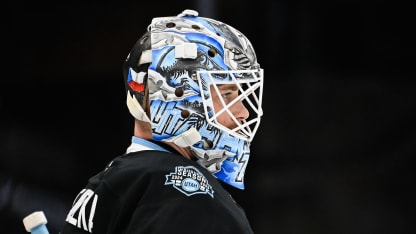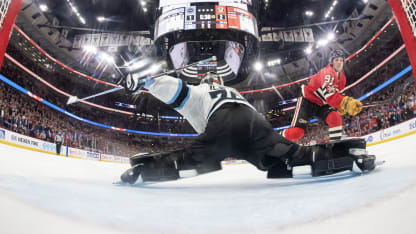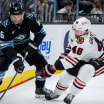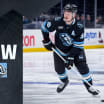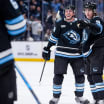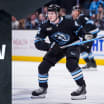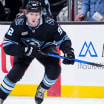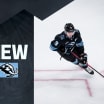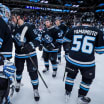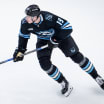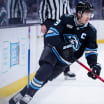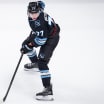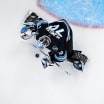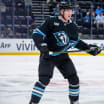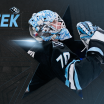Bill Armstrong had no idea who Karel Vejmelka was when he walked past him on the first day of training camp in 2021.
"I thought to myself, 'Wow, we've got some big guys. This guy must be a hell of a fighter,'" Utah's GM said. "Someone eventually said, 'No, that's your goaltender.'"
Vejmelka's rapid rise from forgotten man to five-year NHL extension is a similar story.
Drafted in the fifth round (No. 145) by Nashville in 2015, the 19-year-old Vejmelka opted to stay in Czechia and play, rather than head to the ECHL's Cincinnati Cyclones as the Predators had suggested. He thought that the Czech Extraliga would offer him more guaranteed playing time in a better league, but as the seasons passed and goalie-rich Nashville allowed his rights to expire, Vejmelka wondered if he had lost the opportunity to realize his boyhood dream of playing in the NHL.
"He was a fifth-round pick," Vejmelka's longtime agent, Ryan Barnes said. "At that point in the draft, teams are often just taking swings on guys and some of those guys can kind of fall through the cracks and become afterthoughts."
What Vejmelka did not know was that there were other NHL eyes on him as far back as the 2018-19 season.
"He was a goalie of note through just the normal discovery process that we go through each year," Utah goalie scout Clay Adams said. "We want to keep an eye on any players — for me, goalies — that are drafted by any team and are playing in any league to just get a sense of whether they are improving, declining or staying steady.
"That year, he was playing pretty well for \[Kometa\] Brno, but he was going back and forth between the Czech top league and the second league.
The following year, he was up full time and we kind of had an idea going into the 2019-20 season that we might be needing a free agent. He was playing really well, and he was keeping Brno in games that they really shouldn't have been in."
The 2020-21 season was a difficult one in which to scout players by any means other than video. The global pandemic shut down many countries and borders, making it difficult or impossible for scouts to perform their top task: evaluate players live. Fortunately for the franchise, their central European scout, Teal Fowler, was still traveling to games by car. His first glimpse of Vejmelka came in a Brno game at Bílí Tygři Liberec.
"Brno had two draft eligible prospects in Stanislav Svozil, who was drafted by Columbus, and Jakub Brabenec, who is Vegas property," Fowler said. "I was doing a lot of work on them, but it wasn't easy because you had these ever-changing rules. What border can I cross? How many COVID tests do I need? It was kind of a weird time, but I remember him making 40-plus saves in that game and they ended up winning in overtime although they were totally outplayed.
"His team wasn't very good, but when he was on, he was almost unbeatable. He stole games. I witnessed this like three times and that kind of triggered some more intensified interest."
Fowler ended up watching Vejmelka play about 10 times. He also got the team's director of European scouting, Brett Stewart, involved, as well as Adams and Brian Daccord, who was directing the team's newly created goaltending department at the time.
"I do not bug our pro staff when I watch a 22-year old Czech player score three goals in a game," Fowler said in providing an example of how the scouting process works. "He's going to have to do that consistently. That was the advantage with Veggie is that I was going there often and I was able to see him have this kind of impact for his team in several games."
At that point, Vejmelka was itching for another North American opportunity.
"I was 25 already so I knew there was a bunch of younger guys who were able to sign entry-level contracts," Vejmelka said. "I thought maybe I had more experience, even from playing in the Czech league even though it was kind of different hockey, but I knew it had to happen soon.
"I told my agent, 'Hey, if we get a chance to sign with any other team, I want to try it. I want to sign in the US, and I want to get a chance to play in the NHL one day."
Stewart had talked to coaches and people in Vejmelka’s life to get a sense of his character. Stewart and Daccord had arranged an hour-long Zoom call with Vejmelka and Barnes. Director of hockey operations and salary cap compliance David Ludwig (now Utah's assistant GM) had analyzed all of the financial details of a potential signing, and then-manager of hockey operations Joey Poljanowski had researched all of the comparables.
The result was a one-year, prove-it deal.
Training camp surprise
Vejemlka wasn't expecting a hero's welcome when he arrived in Arizona for training camp on a roster that Armstrong had stripped to the studs to start the rebuild. The Coyotes already had their goaltending tandem set for the 2021-22 season with Carter Hutton and fellow Czech Josef Kořenář. Vejmelka had been signed to battle for time in the American Hockey League with top goaltending prospect Ivan Prosvetov.
"I never thought there was any chance to play in the NHL right away, especially when I'm coming over from the Czech league," Vejmelka said. "I just tried to focus on myself, play the best game I could, be ready for every practice, battle hard and just show my best performance."
Hutton was slowed by an ankle injury in camp so Vejmelka got a chance to go head to head with Kořenář. It didn't take long for Vejmelka to impress first-year coach André Tourigny and goalie coach Corey Schwab. By mid-camp, it was clear that Vejmelka was outperforming Kořenář. As camp and the preseason drew to a close, it was clear he was going to earn the backup spot in the NHL.
"We knew that we weren't going to be challenging for a playoff position that year and we needed somebody who was going to be in there and really just compete and give us the best effort every night," Schwab said. "With Carter Hutton's injury, Karel got an opportunity that he might not have had in exhibition games if Carter was fully healthy. He took advantage of it."
Less than a month into the season, Hutton re-injured his surgically repaired ankle, effectively ending his career. In the blink of an eye, Vejmelka went from hopeful AHL backup to NHL starter.
"Everything happened pretty quick to me, but I didn't really think about what was actually happening," he said. "I told myself, 'Hey, this may be your first game as a starter, but it could be your last game as well. So I just tried to play hockey, have fun and enjoy the moment."
Armstrong ended up claiming goalie Scott Wedgewood off waivers from New Jersey in early November, but Vejmelka played 52 games in his rookie NHL season, facing 1,669 shots on a team that allowed a league-high 35.5 shots per game.
"It was definitely a learning experience for him," Schwab said. "It's something that's often overlooked when Europeans come over, but it's a big adjustment. Communicating in English was difficult for him that first year. He had been in the Czech Republic his whole life and then to be in the NHL at the highest level and do the things you're expected to do as a number one, but also to be able to make adjustments quickly, that's a lot to ask.
"Karel is a worker. He wants to be on the ice so a lot of the learning was how to manage how much he worked and how much extra we did before or after practice, and whether you need to skate at optional skates. Most guys in their first year in the league want to skate on every optional so he just had to understand what it takes on the rest-and-recovery side of the game to put himself in the best position to succeed."
While Vejmelka learned the importance of a proper diet, sleep, and recovery, the team was testing how much of a workload he could handle. Schwab was also working to refine a part of his game that both Adams and Schwab realized would need to change if he were to succeed in the NHL. Vejmelka tended to overcommit and get himself out of position.
"The biggest adjustment was he was going to have to learn how to play more in his blue paint and in between the posts," Adams said. "You can look at almost any goalie in the NHL now and they almost exclusively play inside the blue paint."
"He was a very aggressive goalie when he played in the Czech league," Schwab added. "It was a different style; a different type of game. So that was probably the main focal point for the first year, and going into the next year of managing different situations and understanding that when you're playing against the best players in the world, if they don't have any room to score, they're looking for something else and they need to get to certain areas on the ice to believe that they're going to score on an NHL goalie.
"We talked a lot about reading the play and part of it is understanding, 'Hey, what's that player's next best option? If he doesn't think he can beat you with a shot, what's the next best option?' Karel's reads have gotten much better and the game has got to the point where it's slowed down for him a little bit. He doesn't have to be aggressive if it's not called upon. He's allowing himself to read the plays more efficiently and put himself in the best position possible to make saves."
Coming into his own
Entering Thursday's games, Vejmelka had the NHL's 10th best save percentage (.909) and the seventh-best save percentage (2.47) among goalies who had played at least 30 games. Per evolving-hockey.com, he had the seventh highest goals saved above expected mark at 22.25.
Connor Ingram's unfortunate situation has forced Vejmelka to shoulder a bigger load this season (42 games, 39 starts) than was planned, but that very first NHL season gave him a road map for how to handle the load, and he has delivered with big performance after big performance. Vejmelka was due to become an unrestricted free agent after this season, but talks between Barnes and the Utah management staff that began around the 4 Nations Face-Off break culminated in a five-year deal the night before the team played the Red Wings in Detroit on March 6.
Barnes met Vejmelka at Prime + Proper Steakhouse just before a team dinner and laid out the particulars. By midnight, the sides had a deal. The next day, Vejmelka made 38 saves, including critical, late-period stops on Dylan Larkin and Alex DeBrincat, as Utah rallied from a 2-1 deficit despite being outshot 40-19, to post a 4-2 win that kept them in the Western Conference wild card race.
Vejmelka was beaming from ear to ear when he hopped on a family chat to deliver the contract news.
"It's both my parents and I've got a brother and two sisters, so it was the whole family on the chat," he said. "It was a special situation to let them know I'm staying for five more more years, and they would be able to visit me in Utah again.
"To be honest, I never thought this could happen. It's a pretty crazy story to me, but I couldn't be happier that it happened. Utah is awesome as a state, and Salt Lake as a city. I'm still living my dream, enjoying every moment and every day here."
Although he is deferential to the man he calls Utah Hockey Club's biggest celebrity, Vejmelka admits that hearing the chants of "Veggie! Veggie!" at Delta Center still gives him goosebumps.
"Spicy Tuna (Liam O'Brien) is the most favorite guy for the fans, for sure," Vejmelka said, laughing. "He made a great impact in the summer when we met the fans for the first time. But yeah, when I hear my name or the chants from the crowd during the game, it's a special moment every time. It's fun to play in front of them. It drives me and pushes me. It gives me a special energy to be a little bit more on the edge.
"Like I said, I never thought this could happen to me. It's pretty unique and I really appreciate it because I know it doesn't really happen very often."

